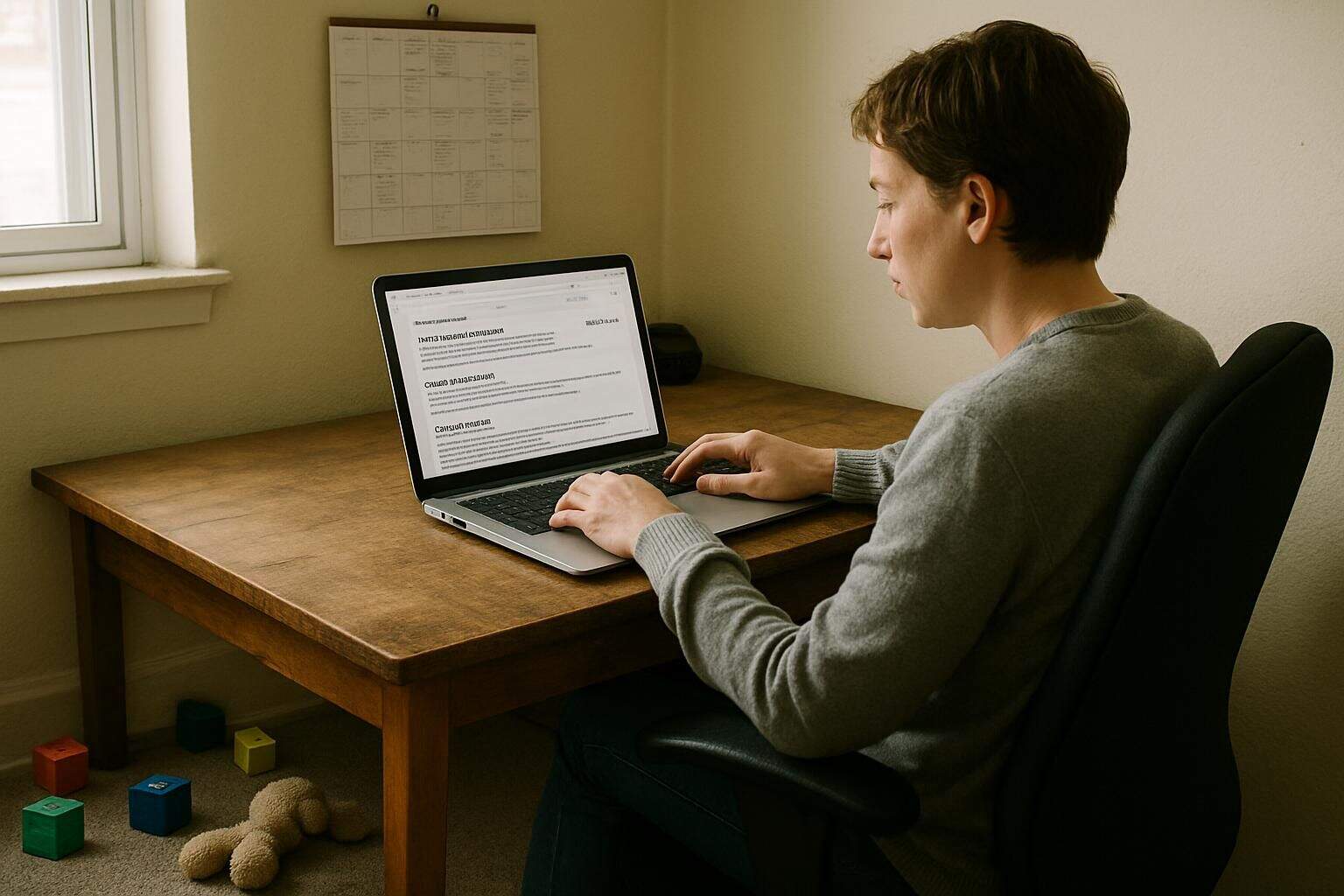Are you struggling to balance work-life duties as one of many single parents and childcare issues keep piling up? High childcare costs often leave single moms with tight budgets, making it tough to find affordable support.
In this blog post, you’ll discover creative hacks and tips—like flexible work from home options—to ease your daily stress. Keep reading for easy ways to simplify your life today!
Key Takeaways
Childcare expenses can consume up to 40% of a single parent’s income, so programs like Head Start and childcare tax credits become crucial for easing financial pressure.
Flexible work hours and remote job setups allow single parents to attend school activities and manage sick days without worrying about their careers.
Connecting with fellow parents builds a support circle, letting you swap childcare duties—saving money and cutting down feelings of loneliness.
Choosing after-school care centers close to your workplace saves commuting time; plus, many offer homework assistance until around 6 PM.
Kids raised by single parents often grow more independent, developing sharper problem-solving abilities compared to other children their age.
Table of Contents
Common Childcare Challenges for Single Parents

Single parents face a tough set of childcare hurdles that can feel like climbing a mountain each day. Finding good care that doesn’t break the bank tops the list, while many struggle to fit work demands around school pickups and sick days.
Finding affordable and reliable childcare

Money worries hit single parents especially hard—childcare costs can really pile up fast. Lots of moms struggle to locate safe, affordable places for their children without draining their wallets.
One smart solution is sharing babysitters with nearby families, which can slash childcare bills in half. This approach works great if you team up with others who live close or keep similar work schedules.
Local programs often step in to help too, providing childcare fees adjusted to your income level.
Plenty of towns offer free support resources—you just need to know where they’re hiding. Food banks, clothing swaps, and community meal programs can ease your financial load while covering childcare expenses.
Some employers even offer flexible spending accounts, letting you set aside pre-tax money to cover daycare bills, which cuts down your overall tax bill. Your workplace health plan might pitch in toward some of these care costs too.
The trick lies in growing a reliable support network and finding out exactly what local aid programs exist in your community.
Balancing work and parenting responsibilities

Single parents often juggle tough decisions every day, balancing job tasks against their children’s needs. Many can’t afford quitting work since childcare costs are so high, yet must manage sick days and school events too.
Working remotely isn’t an easy fix either—kids need attention, which makes meeting deadlines even harder. Finding time for both job duties and meaningful moments with your kids can feel like solving an impossible puzzle.
Constant stress from roles as worker and parent can quickly lead to burnout, leaving you exhausted and overwhelmed.
The struggle isn’t about being perfect – it’s about being present when it matters most.
Creating solid work-life balance begins with setting clear limits. Chat openly with your employer about flexible schedules or remote work setups that fit around your family’s needs.
Some workplaces even offer paid family leave, which single parents can use for doctor visits or school activities. Connecting with your child’s teachers in convenient ways matters too, as Harvey suggests.
This could mean joining a text group instead of attending meetings in person, or pitching in on take-home tasks rather than during-the-day events. The perfect parent myth adds unnecessary stress on single parents, who are already doing their best amid busy workdays and parenting duties.
Managing workplace biases against single parents

Balancing parenthood and work gets tougher if your workplace holds unfair biases. Many managers wrongly assume single parents aren’t up for major projects—or can’t stay late. These stereotypes can affect your career growth and paycheck.
I once worked for someone who consistently overlooked me for business trips, thinking child-care would be an impossible hurdle.
Keeping track of weekly accomplishments clearly demonstrates your value at work. Career expert Carter suggests this as a helpful way to showcase your skills and commitment. Thankfully, some workplaces now provide remote options for single mothers with busy schedules.
Flexible work arrangements let you attend a kid’s school event without missing job duties. Fair employment laws also exist to protect single parents from unfair treatment at work, so get familiar with your rights.
Coping with limited personal time

Workplace bias often adds extra stress, leaving single parents with even less personal time. With a demanding job and kids, finding moments for yourself can feel nearly impossible.
Many solo parents feel drained from handling daily parenting duties alone. Carter highlights that short breaks can truly help—just three hours a week can significantly improve mental well-being.
Hiring a babysitter isn’t selfish; instead, it counts as essential self-care, helping you recharge and parent better.
Getting personal time doesn’t always mean long periods away. Harvey manages this challenge by scheduling independent playtime for her daughter during working hours, along with short breaks spent together.
This plan creates brief moments to recharge and teaches kids to entertain themselves. Another handy trick is teaming up with other single mom challenges parents to share childcare duties.
You watch their children one day, they return the favor another day—giving everyone no-cost free time. These simple steps can help you reclaim your limited personal time, guilt-free.
Emotional and Social Impacts on Single Parents

Single parents face deep feelings of loneliness and struggle with who they are outside of parenting, while also battling guilt over missing key moments in their child’s life due to work demands – read on to learn how these emotional burdens affect daily life and what you can do to ease this mental load.
Feelings of isolation and identity struggles
Many single moms go through deep loneliness during their parenting journey. I remember countless nights feeling disconnected from everyone after putting my kids to sleep—that quiet emptiness was tough.
Nearly half of all children raised in separated households deal with significant life shifts, leaving parents overwhelmed and unsure. Your sense of self can quickly blur—between parenting duties, work responsibilities, and personal needs.
Stress piles up fast, making you wonder who you really are beyond the label of “mom”.
Creating a good support network can break this pattern. Try reaching out to family members, connecting through online parenting groups, or getting to know other parents through school activities.
Taking these steps can ease the mental exhaustion of parenting alone.
The hardest part wasn’t the extra work—it was feeling like I had no one to share my wins and losses with at the end of each day. Finding my tribe of other single parents saved my sanity.
Much of your identity struggle comes from juggling multiple roles without enough support. Working mothers often deal with workplace cultures that make it hard to take time off when kids are sick.
Anxiety about health insurance and overtime pressures often compete against bedtime routines and homework help. Many women feel guilty about not spending enough family time, but at the same moment worry they’re falling short at work.
This constant tension between family and job duties creates confusion, causing personal dreams and desires to fade into the everyday routine.
Guilt over limited time with children
Single parents often feel isolated and wrestle heavily with guilt for spending time apart from their kids. Long hours at work, or tasks that creep into family time, make the guilt even tougher to shake off.
Carter, a single mom herself, understands this struggle all too well. She jokingly refers to Apple as her “co-parent” since screen time steps in whenever her schedule keeps her away.
A few simple guidelines can help ease some of that pressure. Creating a “quiet time” rule—say half an hour right after school—offers both parent and child a little breathing room.
Setting a bedtime restriction, like turning off the iPad an hour before sleep, promotes healthier sleep habits. Sure, these small adjustments won’t completely eliminate guilt—but they do help make each moment together count even more.
Low-income single parents often face extra stress here, since earning overtime pay means missing out on valuable family moments.
Economic Challenges in Single-Parent Childcare

Single parents face crushing money troubles with childcare costs eating up to 40% of their income, making it hard to afford basics like food and rent – read on to learn smart ways to cut costs while still giving your kids the care they need.
High childcare costs
Childcare costs quickly drain finances, particularly for single parents. Last year, daycare expenses for my daughter totaled nearly $1,200 each month—roughly 40% of my paycheck. Such steep expenses often push parents into difficult work decisions.
Many quit their jobs entirely, especially those earning minimum wage, because childcare expenses exceed wages. For families facing this reality, the numbers simply don’t work.
The most expensive thing about having kids isn’t what you spend on them – it’s what you can’t earn while caring for them.
Even with careful budgeting, affordable childcare remains out of reach for many families. Bills for health insurance, groceries, and basic expenses already stretch incomes thin. Government assistance provides relief to some—but others earn slightly too much money to qualify yet not enough to pay for decent childcare.
Child care subsidies differ greatly state-by-state, forcing countless parents into stressful searches for affordable alternatives.
Struggles with meeting basic needs like food and clothing
Single parents face difficult financial choices every day. Costs for food and clothes pile up quickly, forcing many families to stretch every dollar. During the COVID-19 pandemic, poverty rates and food shortages hit single-parent families harder than others.
Job losses soared—about 25% of single parents lost their jobs in April 2020 alone. I’ve seen this play out firsthand; my sister often skipped meals then, ensuring her kids had enough to eat.
Everyday items like winter coats or school supplies became costly luxuries for many solo parenting households.
Relief arrived in July 2021, as the expanded Child Tax Credit kicked in. The increase helped families breathe easier and reduced hunger rates. Several single moms shared with me how they finally purchased fresh fruit instead of relying on noodles again and again.
The federal minimum wage still hasn’t caught up to rising prices, making state assistance crucial for survival. Food stamps and local clothing banks often make all the difference. Many parents use Family Medical Leave Act (FMLA) time—even without being ill—to manage childcare issues, simply because money is too tight for covering basic needs.
Solutions to Childcare Struggles

Single parents face many childcare hurdles, but smart solutions exist to make daily life easier – from government aid programs to flexible job options that let you work from your couch while earning equal pay for equal work.
Read on to discover nine game-changing hacks that won’t just save you money but also precious time with your kids!
Accessing childcare subsidies and financial aid
Money issues hit especially hard for single moms balancing kids and work. Financial aid programs for childcare helped me cut daycare bills by half, providing real relief. Programs like Head Start and Early Head Start offer free childcare services—from birth up to five years old—if your income meets their requirements.
Getting your little ones into these programs can give you extra room in your budget. At tax season, the Child and Dependent Care Tax Credit can even return some cash to your wallet.
Financial aid for childcare isn’t just support—it’s freedom to work without worry.
Many states have their own childcare assistance programs, based on your income level and hours spent at work. Employers sometimes pitch in too, offering dependent care accounts that lower your taxable earnings.
Talk to someone in human resources at your job to see if health insurance plans include options for dependent-care coverage. These programs can save you thousands every year, helping you tackle workplace discrimination and fight for equal pay at the same time.
Flexible work arrangements and remote work options
Flexible working can be a lifesaver for single parents. Remote jobs let you skip traffic headaches and remain near your kids throughout the day. Today, lots of employers offer remote days or flexible schedules—perfect for attending school activities and managing sudden sick days.
In fact, the San Francisco Family Friendly Workplace Ordinance allows parents to request adjusted schedules if childcare requires it. Cities, like San Francisco, are stepping up with practical solutions to help working parents.
Talk with your manager about four-day weeks, job-sharing, or part-time roles, matching your work hours with family duties. Flexible work arrangements often ease worries about keeping health insurance while freeing up time for family time.
Single moms and dads also experience better sleep and fewer concerns about unfair treatment at work, thanks to greater schedule control. It’s also much easier to build friendships and support networks when you’re not chained to your office, struggling through endless emails.
Once your flexible job arrangement is set up, sorting out suitable childcare becomes simpler, too.
Building a supportive community network
Single parents do well when they have reliable and caring support around them. Social events aren’t just fun—they help parents meet others who might swap childcare favors down the road.
Many moms build lasting friendships by joining local parenting groups, creating solid backup options for childcare. Your personal network might include neighbors, church friends, or families from your child’s school who lend a hand during work emergencies or tight schedules.
Community support groups also give single parents a private, friendly place to talk openly about their daily struggles. These groups regularly plan playdates—kids enjoy themselves while parents open up about parenting challenges and life issues.
Connecting socially does more than reduce feelings of loneliness—it offers valuable, practical help that makes single-parent life easier. A trusted neighbor might offer to drive your child to soccer practice on days you’re stuck late at work.
Another parent from your circle may happily watch your kids while you’re off at a job interview. Even small favors from people in your community can significantly improve your daily routines.
Many single moms share how their support network makes balancing work and family simpler, easing stress about childcare concerns. It does take some effort and patience to build those relationships, but the positive returns are worthwhile, giving you extra breathing room and more peace about your child’s care.
Choosing the Best Childcare Options

Finding the right childcare option can make life much easier for single parents. You need to pick a place that fits your work hours, budget, and your child’s needs.
Evaluating daycare centers and in-home care
Selecting the best childcare option can greatly impact your routine and your child’s development. Here are practical steps to help you decide:
- Visit daycare centers during busy hours, so you can observe staff interactions with the kids and see how they resolve conflicts.
- See if the daycare provides planned group activities that build social skills—a major benefit offered by many centers.
- Find out about staff turnover rates and training standards, since stable caregivers form closer bonds with children.
- Compare daycare pickup times to your work hours, so you can avoid late charges that quickly add up.
- Think about in-home childcare if your kid thrives with more one-on-one attention or has unique sleep patterns different from daycare routines.
- Always ask for background checks on potential in-home caregivers, ensuring your child’s safety while you’re busy at work.
- Calculate real cost differences between daycare centers and home care—including any tax credits you may be eligible for as a single parent.
- Ensure caregivers can reasonably accommodate any disabilities or specific medical needs your child has.
- Chat with fellow parents who tried daycare and in-home options, so you can get straightforward advice about care quality.
- Check daycare hours carefully to ensure they align with your job—particularly if you have evening or weekend shifts.
Next, let’s check out after-school activities that could help cover care needs outside regular hours.
Considering after-school programs and extracurricular activities
After-school programs offer single parents a reliable place for kids, keeping children safe and active until the workday ends. They help kids learn better and develop stronger social skills, too.
- Pick a location near home or work to make pickups simple and stress-free. My daughter’s program was just three blocks from my office, saving me hours each week.
- Find a cost that fits comfortably within your budget—many programs offer income-based fees. Some workplaces even provide childcare benefits through health insurance, helping lower your expenses.
- Choose program hours that align closely with your work schedule, ensuring no gaps force you out of the office early. Good programs typically stay open until at least 6 PM, giving parents more breathing room.
- Check the quality of the staff—ask about background checks, experience, and training. My son flourished after we found teachers who genuinely understood his needs.
- Confirm homework help is regularly offered, taking off pressure at home in the evenings. Look for programs with staff who are comfortable answering assignment questions and guiding your child.
- Look into fun extra activities like sports, art, or music—these let your child explore new hobbies without extra drive time. These opportunities encourage new skills beyond standard school lessons.
- Check if snacks or meals are provided, freeing up your kitchen duties at home. Healthy food offerings teach good eating habits and positively impact your grocery budget.
- See if the program offers transportation from your child’s school directly to their site. Many good after-school centers arrange safe pickups, removing the burden of an extra commute.
- Ask about flexibility for late pickups, providing leeway on tough workdays or unexpected delays in traffic. Good programs recognize—and accommodate—the daily time crunches single parents face.
The Positive Role of Single Parents in Child Development

Single parents shape kids who stand on their own two feet. They build close bonds through quality time that matters more than quantity.
Encouraging independence and resilience
Growing up in a single-parent household gives kids powerful opportunities to build strength, independence, and confidence. I’ve watched my daughter glow with pride after solving tricky math problems herself, or choosing outfits alone for school.
Letting kids take part in family decisions helps them develop a solid sense of responsibility and self-worth. In fact, experts note that children raised by single parents often have stronger problem-solving skills than other kids their age.
They learn early to rely on themselves, making choices without needing constant guidance.
Dealing with challenges builds mental toughness—and single parents offer daily chances for kids to strengthen that skill. By the age of eight, my son already packed his own lunch and set his alarm clock each night.
Little victories like these quickly build into real self-confidence. The Fair Employment Act helps single working mothers by offering job flexibility, making it easier to support kids’ personal growth at home.
Children who regularly tackle small, everyday hurdles become adults who handle pressure with ease. They carry this confidence into their school lives, friendships, and eventually their future careers.
Building strong parent-child relationships
Raising strong, self-reliant kids matters—but building a close bond with your child is the true heart of single parenting. A steady routine gives kids a sense of safety, while also creating chances to share special moments.
Many single moms find simple daily activities like bedtime stories or dinner together build lasting trust. These small, yet powerful gestures help push back feelings of isolation that single parents often face.
Involving your child in household chores does more than ease your to-do list. Age-appropriate tasks teach kids valuable life skills and help them feel like an important part of your team.
Completing chores together naturally leads to conversation, laughter, and problem-solving.
Your support system makes a big difference, too. Family, friends, and fellow single parents can step in with childcare, advice, or emotional support, helping you create a caring home atmosphere.
Strong connections also protect you from feeling alone at work and make it easier to manage your weekly responsibilities.
Resources and Support for Single Parents

Single parents can tap into a wealth of help from both local and national sources. Check out free guides, tax credits, and state disability insurance programs that ease your financial load while raising kids.
Government programs and policies
Many programs exist to help single parents handle childcare costs. Temporary Assistance for Needy Families (TANF) provides cash support for essentials like food and housing. Georgia residents have options like CHIP for children’s healthcare, WIC for nutrition, and SNAP for grocery expenses.
These services ease the worry of meeting daily needs while maintaining employment.
In California, the Fair Employment and Housing Act protects single parents from job discrimination related to family status. This law prevents employers from lowering pay or firing workers just because they’re raising kids alone.
San Francisco even has a Family Friendly Workplace Ordinance, which lets parents request flexible scheduling to manage childcare tasks.
For many single moms, state disability insurance can offer important financial support during health-related absences from work. After my divorce, I briefly relied on SNAP assistance—it was crucial for feeding my two children while searching for a better-paying job.
Now, let’s explore other ways to build helpful support systems outside of government assistance.
Community support groups and online resources
Single parents have more than government aid to rely on—they can lean on strong community connections too. Groups such as Table for One Ministries offer supportive programs specifically created for parents raising children alone.
Within these groups, you can freely exchange personal experiences with others facing similar daily challenges. Another organization, The Life of a Single Mom, hosts supportive networks where working mothers openly talk about workplace concerns, including equal pay and wage discrimination.
Digital tools can also ease daily parenting routines. Helpful apps can organize your child’s weekly activities, lowering stress during a busy workweek. Other apps even connect you with babysitters who’ve completed thorough background checks, making it quicker and safer to find reliable childcare.
Online discussion forums link parents working remotely, helping each other balance inbox tasks and family demands. These digital supports create extra time, allowing busy moms crucial opportunities to focus on the importance of self care for moms.
How Will Childcare for Single Parents Evolve in 2025?

By 2025, childcare choices for single parents should grow, thanks to more flexible work options. Many companies will likely make remote jobs the norm, helping moms and dads juggle their career duties and family life.
Equal pay movements will also pick up speed, shrinking wage gaps that currently affect single mothers the most. Government support may expand too, providing improved health insurance with cheaper premiums for single-parent families.
Technology stands to simplify childcare duties, offering apps that link parents directly to reliable, thoroughly screened caregivers nearby. These convenient platforms will provide fast childcare solutions during sudden work schedule shifts.
More employers might set up childcare facilities on-site and roll out family-friendly policies, reducing workplace bias against parents. As a single mother, you could soon have access to specific resources that suit your exact needs—instead of generic solutions meant for everyone.
People Also Ask
How can single parents manage both work and childcare effectively?
Remote work can really help single parents juggle their duties. Many companies now allow employees to work from home, giving parents the chance to earn money while still being around for their kids.
What workplace rights protect single parents?
Federal laws, like the Equal Pay Act, stop bosses from treating people unfairly based on their gender—this includes single moms and dads. Employers also cannot discriminate against people who adopt or foster children. Plus, state laws on minimum wage make sure you take home enough money to look after your family.
How can single parents find safe and reliable childcare?
Choose childcare services that are licensed and carefully screened. Some healthcare plans can even help cover certain childcare expenses. Talk to other local parents too—they often have good advice about trusted places nearby.
Do single parents have options to reduce healthcare costs for their kids?
Yes, many single parents can get lower-cost health coverage through government assistance programs. Several employers also provide affordable family health plans that fit comfortably into your budget.
What can companies do to better assist single parents?
Organizations that value diversity and have inclusive policies usually understand the struggles single parents go through. Good employers provide flexible working hours and decent wages above the state’s minimum. They also understand and support parents who need time off for school activities or childcare emergencies.
References
https://www.care.com/c/7-child-care-issues-single-parents-face/ (2025-04-25)
https://www.openarmspregnancy.com/how-to-balance-work-life-and-parenting-as-a-single-parent
https://www.verywellmind.com/single-parenting-stress-how-to-beat-burnout-5216180 (2023-11-20)
https://pmc.ncbi.nlm.nih.gov/articles/PMC9716188/
https://childcare.gov/consumer-education/get-help-paying-for-child-care
https://dad.ceo/article/faq-for-single-dads-parenting-in-2024
https://hopbe.org/building-a-strong-support-network-connecting-single-parents/
https://americanspcc.org/choosing-childcare-a-guide-for-modern-parents/
https://www.betterhelp.com/advice/parenting/tips-and-tricks-for-raising-children-as-a-single-parent/
https://childcare.gov/state-resources/georgia/financial-assistance-resources-for-families
https://weekplan.net/top-9-time-management-tips-for-single-parents
